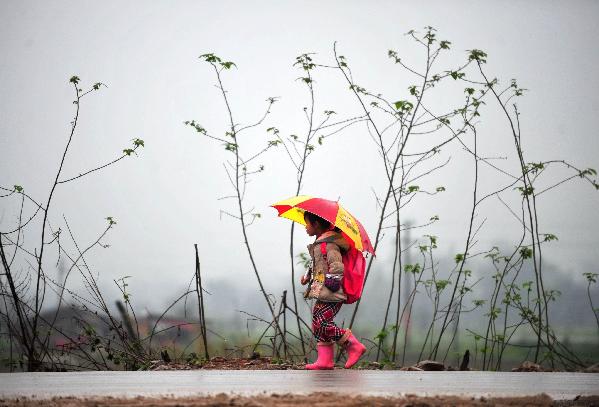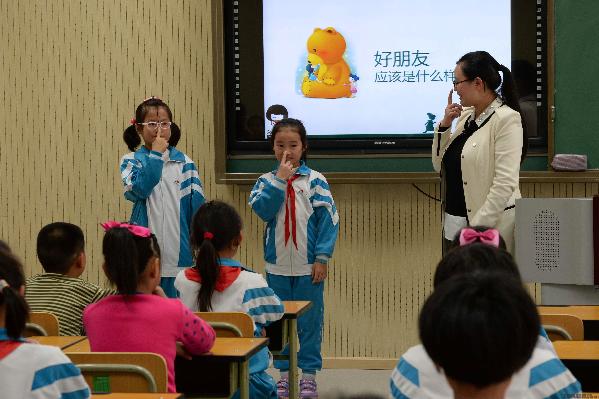| 
A primary school student walks home alone after school in Liuzhou, Guangxi Zhuang Autonomous Region
Child victims of sexual abuse are often preyed upon not by strangers but people known to their family, says a report published by Protecting Girls, a charity project. The report covered sexual abuse cases published by the Chinese media from May 23, 2013 to May 22, 2014.
In recent years, there has been increasing media coverage of child sex abuse. On May 8, 2013, a headmaster and a government employee in south China's Hainan Province were reported to have taken six primary schoolgirls to hotels. Within 20 days of the incident becoming public, eight more cases of children being sexually abused were reported by the Chinese media. These incidents caused nationwide concern over the safety of the most vulnerable members of society.
Reports of sexual assaults on minors were disturbingly frequent in China from 2013 to 2014, with 192 cases published by the media, according to the report, averaging one reported case every 1.9 days. However, the total is believed to be tragically far higher, with unreported incidents likely to be more common as victims are often afraid to tell their parents or teachers.
In some cases, parents who have learned about the assaults choose to keep quiet out of concern for their children's "reputation," Wang Zhongwu, a professor of sociology at Shandong University, told Xinhua News Agency in July 2014.
The report also said most of the 343 victims in the documented cases are primary school students, with children between eight and 14 years accounting for 85 percent of the total. Over 55 percent of the cases happened in rural areas, where many children have been left behind in villages to live with relatives while their parents seek a living in cities. Of the 192 cases, over 80 percent assaults were committed by acquaintances, with 42 cases involving the victims' teachers and 36 their neighbors.
Seven girls from the Shangyuan Village Primary School in Ruichang, east China's Jiangxi Province, were sexually assaulted by their 62-year-old teacher Tao Biaogong from September 2012 to May 2013, according to Xinhua. Tao called the girls to the classroom after school or his dormitory under the pretext of correcting their homework or listening to them recite passages from the textbook. Six of the girls were found to have contracted sexually transmitted diseases (STD). All of them were "left-behind children" whose parents had entrusted them to the care of their grandparents when they were less than 1 year old. In addition to the physical harm, the girls have mental scars, with some showing suicidal tendencies.
"Left-behind children who live with their grandparents or other guardians, especially girls, often lack adequate protection and care, which predators may identify as opportunity. The psychological wounds inflicted on this group are often deep and difficult to heal," said Sun Yunxiao, Deputy Director of the China Youth and Children Research Center.
Victimization is not gender specific. Of the 192 cases reported, six were assaults on boys. A seven-year-old in Shadun Village of Wuxue, central China's Hubei Province, was sexually abused by one of his male teachers and contracted STD from the attack, Xinhua reported in 2013.
The boy's parents worked far from home in south China's Guangdong Province. Their son told them every time the teacher abused him, the latter would give him snacks before the act. As a result of the abuse, the once active and happy boy has become quiet, according to his mother.
"Today more and more boys are becoming victims of sexual assault. As the victims are often ashamed to report the incidents or lack self-protection awareness, many cases are kept secret," Gao Yujing, the host of a helpline for children of single parents, told Beijing Evening News in November 2014.
"Sexual abuse will cause both physical and psychological damage to a child. Some victims will hate school, suffer anxiety or depression, or even develop split personalities. It may also affect a child's attitude toward sex," Li Chunman, a psychologist, told China Youth Daily in July 2014.

A volunteer teacher from Protecting Girls takes a class at a primary school in Beijing
Lack of education
The frequent child sexual abuse underscores the lack of sex education in China.
"We seldom teach our children the things nobody can ever ask of them," Li Bin, a professor of sociology with Central South University in Changsha, central China's Hunan Province, told Xinhua in July 2014. "As a result, many children who have become victims of sexual abuse have no idea that they have been abused. We seldom tell our children that they can say no to teachers if [the latter] ask them to do something that makes them uncomfortable."
According to a survey of 235 boys and 219 girls conducted by Protecting Girls, only 17.58 percent of children knew what sex education is; 60.88 percent had no idea and 21.54 percent knew just a little about it.
Of the 902 parents surveyed, only 35.92 percent had given their children some form of sex education. Many parents had never taught their children how to prevent sexual abuse.
"In China, few parents recognize the importance of sex education and often wait until their children are 14 or 15 years old," Hong Daode, a law professor at the China University of Political Science and Law, told China Daily in June 2014.
"Schools offer only physical health classes rather than starting sex education courses, and most victims lacked awareness of how to protect themselves," he added.
Rise to action
The high incidence of sexual assault cases has caught the attention of the government. On September 24, 2013, four institutions - the Ministry of Education, Ministry of Public Security, Central Committee of the Communist Youth League and the All-China Women's Federation - issued a notice, demanding local education departments hold sexual abuse prevention classes by starting courses and distributing pamphlets on the issue.
Social organizations are also acting to combat child sexual abuse. Protecting Girls is such an initiative.
The program was launched by 100 women journalists from across the country in June 2013 following a string of sexual abuse cases that year. The project aims to spread awareness of how to avoid sexual abuse, especially making children aware how to protect themselves from such attacks.
"However, the biggest challenge is to teach this in rural areas where there is a large number of left-behind children. Few local governments from such places have contacted us," said Sun Xuemei, one of the initiators of the program. "Another problem is that there are not enough volunteer teachers."
The program has compiled its own teaching materials, which were modified over 40 times by more than 20 experts on child protection. By July 23, 2014, the program had trained nearly 1,000 volunteer teachers and given lessons to over 100,000 children in more than 20 provinces including Shandong, Zhejiang, and Yunnan. It has also given out over 120,000 pamphlets on preventing sexual abuse.
Shortcomings of the law
In addition to spreading knowledge on how to prevent sexual abuse, China's laws are being improved to impose harsher punishment on offenders.
Participants at the annual sessions of the National People's Congress (NPC) and the National Committee of the Chinese People's Political Consultative Conference (CPPCC) in March 2014 proposed to repeal the law that identifies sex with an underage prostitute as a separate crime, saying such crimes should be treated as child rape and be punished accordingly.
Under the current law, people who have sex with prostitutes under 14 face maximum 15 years in prison, whereas those convicted of raping a child face the death sentence.
Zhu Zhengfu, a member of the National Committee of the CPPCC, criticized criminalization of children under 14 who are pushed into prostitution, saying the law improperly treats the victims as prostitutes, instead of as children who have been raped.
However, the proposal was not accepted as the NPC's Legislative Affairs Committee said the law itself is not wrong but is improperly applied to rape cases. The application of the law should be more strictly supervised to ensure justice. However, the committee also said it would consider the suggestions while revising and improving the Criminal Law.
Role of schools and parents
With legal progress in protecting children from sexual abuse yet to be made, parents and schools should play their part in protecting children from sexual abuse.
"Parents should give children the necessary sex education," said Sun Yunxiao with the China Youth and Children Research Center.
They should tell children at an early age that others should not touch their bodies, especially sex organs. If children know this, they will shout if somebody tries to abuse them and the offenders may stop, he added.
Parents whose children have suffered abuse should call the police. They should also preserve the evidences, such as the clothes the children wore when they were abused.
Children should also be encouraged to confide in people they trust rather than hide the fact that they have been abused. Some girls who have been sexually abused feel too ashamed to tell their parents. Such an attitude could be changed through sex education.
In addition to sex education courses, schools should enhance safety measures. "School management staff should regularly patrol classrooms and equip students' dormitories with protective measures because many sexual assaults occur in classrooms and dormitories," Shi Weizhong, a senior official with China's Supreme People's Procuratorate, said.
To prevent teachers from committing sexual abuse, higher moral standards should be set during recruitment. Once employed, teachers should be given training in morality.
"We should trust teachers but contact between teachers and students should be restricted. For example, teachers should offer one-to-one instruction to students not in dormitories but in their office, with the door wide open," said Sun Yunxiao.
|